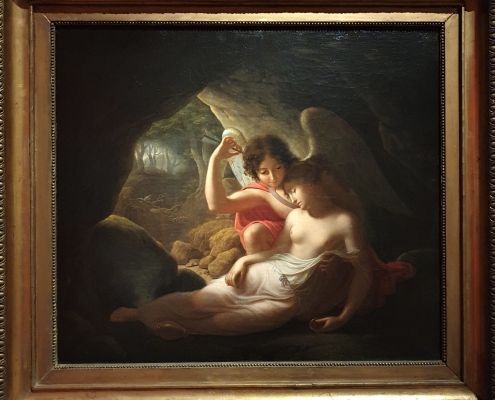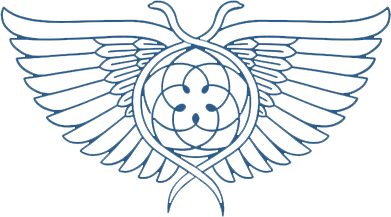“Nor let the fools mistake love: for there are love and love.” – The Book of the Law
For the Greek poets, the scheming mother of Necessity and goddess of love Aphrodite was vastly complex, resulting in an entourage of godlings called the Erotes associated with different dimensions of love.
Anteros stood for selfless love, Himeros for impetuos love, Hedylogos for the language of love, Hymenaios the guardian of the bridal-chamber, Hermaphroditus protector of what we now call fluid gender, and Pothos for languorous longing, especially for the absent.
We find agape in the Bible in St. Paul’s letter to the Corinthians, translated as charity, or in modern times simply as love, but it goes as far back as Homer, translated as affection, and it is considered the most generous form. It is unconditional love.
Philia is the affection one feels for an equal, dispassionate virtuous love, the loyalty towards friends, family or community. It is friendship.
Philautia is the love of the self, both a human necessity and a moral flaw when reaching the shores of egotism, divided further into the negative self-obsession and the positive self-compassion. It is self-love.
Storge is the natural empathy most often describing family relationships like the affection of parents toward their offspring, or one’s love towards their country, yet it can also be interpreted as the feeling between lovers that is not based on physical passion but rather on mutual interest. It is familial love.
Xenia is the courtesy shown to guests, generosity for those who are far from home, a reciprocal relationship based on rituals and gift-giving. It is hospitality.
Eros is the most complex of them all. The meaning is love in the sense of sensual desire or intimacy, though with sexuality as a secondary component.
According to Plato, it is through the means of this love that one may reach transcendence. It is Eros that helps the soul recall knowledge of Truth. Erotic desire retains its quality of unconscious aspiration to the transcendental Beauty, towards the non-corporeal plane of existence, but sensual desire comes not only in the form of human interaction, as the senses are delighted in other ways such as music or art.
Through the contemplation of ideal forms the gradual elevation in the nature of the human being takes place. Eros is the link between existence and the essence of being, from ideal physical form to the intellectual cosmos, thus making the philosopher the supreme lover, he who loves wisdom – the art of ascent towards Truth and detachment form this world.
In short, it is Eros that helps the soul recall knowledge of beauty, thus reaching towards spiritual truth and virtue. Beauty inspires sensual desire, which in turn aspires towards the ideal, linking Beauty, Goodness, and Truth.
In mythology, this picture is painted by the story of Eros and Psyche.

Eros and Psyche painted by Christian Gottlieb Kratzenstein taken at Glyptoteket, Copenhagen
Psyche’s fairness discouraged men from asking for her hand, which led the girl towards hating herself and her parents towards Miletus to consult Apollo’s oracle, who proclaimed:
“Her husband is no wight of human seed,
But serpent dire and fierce, as may be thought,
Who flies with wings above in starry skies,
And doth subdue each thing with fiery flight.”
Disheartened but pious, her parents obeyed the oracle. After being left alone, Psyche was lifted by the Zephyrus the West Wind, and transported to a heavenly palace in a valley where she was provided with the most delicious meals and other pleasurable things. Upon going to bed in the evening, Psyche was visited by her unknown husband, with which she consummated her marriage. Her days were filled with beauty and pleasure, whilst her nights were spent with her unseen husband. Eventually, she was with child and taken by loneliness, she asked her husband for allowing the visit of her family.
Upon visiting and finding out she had not known her husband’s face, the jealous sisters convinced Psyche he must be a hideous monster who is planning to devour their child, eventually convincing her to kill him.
That very night Psyche attempted to follow suit, approaching sleeping Eros with a razor and a lamp, and pricking herself on one of his arrows in the process. Awakened by this and furious at Psyche’s broken promise of having looked at him, Eros flees.
Now even more in love with her husband, Psyche starts her frantic search for him in every land. Even the goddesses Demeter and Hera refused to help her, lest they should wake the wrath of Aphrodite. Eventually, Psyche reaches the goddess of love herself. Still upset over the matter, Aphrodite throws Psyche in the hands of her servants – Sorrow and Sadness, and gives her four impossible tasks.
She was to sort out a heap of grains, gather golden wool from murderous sheep, fetch a jar of Stygian water, and collect a day’s worth of Persephone’s beauty. Each task proved harder than imagined, and each time Psyche found herself on the brink of giving up. In these moments, help always came from outside. An ant helped her with the grains, a reed sang to her the way around the sheep, Zeus’ own eagle filled the jar, and finally the tower from which she planned to throw herself from whispered of another way of reaching the Underworld.
Like Pandora and her jar, Psyche also opened something which should have been left closed: the box containing Persephone’s beauty. Though not in the name of curiosity, but rather in a desperate attempt towards gaining back the love of her husband, she opened the box and was immediately taken by an ‘infernal and deadly sleep’.
It was at this point that Eros returned, and not wishing to see her tortured he wipes away the death-like sleep and begs Zeus to make her immortal. Merciful Zeus agrees and gives Psyche ambrosia, which appeases Aphrodite as well and finally leaves the two lovers as equals. The fruit of their marriage turns out to be a daughter, named Hedone – the Goddess of Pleasure, whom the Romans called Voluptas.


